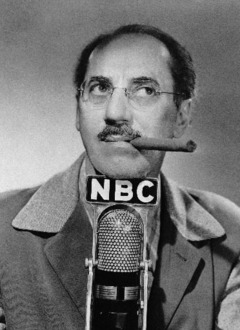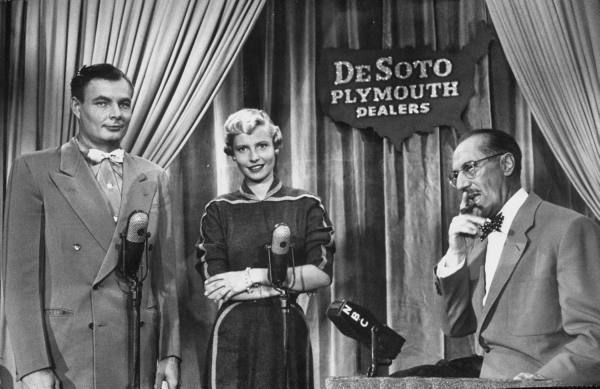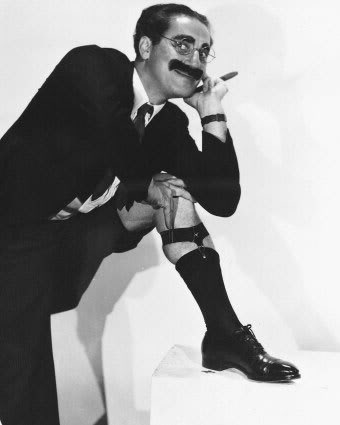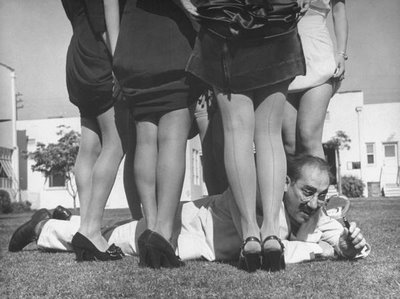Posted onDecember 1, 2009
Filed under Uncategorized | Leave a Comment
 Despite the great success of his radio and television quiz show You Bet Your Life, Groucho Marx influence on early television, and television history has been often overlooked. He is most often remembered as the “leader” of the Marx Brothers comedy troupe, and for uttering famous witticisms such as:
Despite the great success of his radio and television quiz show You Bet Your Life, Groucho Marx influence on early television, and television history has been often overlooked. He is most often remembered as the “leader” of the Marx Brothers comedy troupe, and for uttering famous witticisms such as:
Time flies like an arrow, fruit flies like a banana.
I would never join a club that would have me as a member.
These are my principles, if you don’t like them, I have others
…and so on.
Because if his success in film and his famous wit, it is easy to overlook the innovations that he and the producers of You Bet Your Life brought to TV.
 The show was concieved by John Guedel while in the audience of a radio show featuring Bob Hope and Groucho in 1947. During one section of the show the two stars went off script for a half hour over the time that was alotted for the skit, riffing off of each other to the delight of the audience.. Guedel was a producer of a couple of “reality” radio shows such as People are Funny. After the show he approached Groucho with the idea of him hosting the first quiz show where the quiz itself would be secondary to the interviews of the contestants by the host. He had been trying to get into radio as more than a guest star on variety shows, and accepted Guedels offer even though his previous attempts had been flops, and while he had always coveted knowledge and intellect, Groucho considered hosting a quiz show to be “slumming it”. The show quickly became the top rated quiz on the radio. While this success was due in large part to the quick witted banter of Groucho, it was even more due to the way in which the show was recorded and edited for playback over the radio waves. Recording a radio show was almost unheard of at the time that YBYL was put on the air, most thought that it would rob the performances of their life and spontanaety. Conversly this decision to record almost added more life to YBYL. Instead of feeling any kind of time pressure, Groucho was able to take his time with the contestants, and allowed to search for the comedy in he lives of the everypersons. This comedy could then be cut down and edited together to make a more rapidly funny show. When the shows popularity brought it to TV, there was nothing to do but figure out how they could record it and edit it in the same fashion for the same effect. The producers devised a method in which 2 fil;m cameras would be at each camera position, so that when ones small film cartridge started to run out the other would begin recording making a seamless transition, so that none of Grouchos interview would be missed, nor would the momentum be broken to reload. The set was made to look very simple, to not take away from the interviews, and the camera shots were very static and similar to aid in the editing process. They sometimes edited together two seperate episodes.
The show was concieved by John Guedel while in the audience of a radio show featuring Bob Hope and Groucho in 1947. During one section of the show the two stars went off script for a half hour over the time that was alotted for the skit, riffing off of each other to the delight of the audience.. Guedel was a producer of a couple of “reality” radio shows such as People are Funny. After the show he approached Groucho with the idea of him hosting the first quiz show where the quiz itself would be secondary to the interviews of the contestants by the host. He had been trying to get into radio as more than a guest star on variety shows, and accepted Guedels offer even though his previous attempts had been flops, and while he had always coveted knowledge and intellect, Groucho considered hosting a quiz show to be “slumming it”. The show quickly became the top rated quiz on the radio. While this success was due in large part to the quick witted banter of Groucho, it was even more due to the way in which the show was recorded and edited for playback over the radio waves. Recording a radio show was almost unheard of at the time that YBYL was put on the air, most thought that it would rob the performances of their life and spontanaety. Conversly this decision to record almost added more life to YBYL. Instead of feeling any kind of time pressure, Groucho was able to take his time with the contestants, and allowed to search for the comedy in he lives of the everypersons. This comedy could then be cut down and edited together to make a more rapidly funny show. When the shows popularity brought it to TV, there was nothing to do but figure out how they could record it and edit it in the same fashion for the same effect. The producers devised a method in which 2 fil;m cameras would be at each camera position, so that when ones small film cartridge started to run out the other would begin recording making a seamless transition, so that none of Grouchos interview would be missed, nor would the momentum be broken to reload. The set was made to look very simple, to not take away from the interviews, and the camera shots were very static and similar to aid in the editing process. They sometimes edited together two seperate episodes. 
Groucho and his show do have the distinction of being one of the first recorded television shows, one of the top rated shows of the 50′s, and being the first Quiz/Game show to be put into synndecation, but I feel that these accomplishments are minor compared to the staple genre that they helped create: the Late Night Comedy Talk Show. In the beginning all the contestants were “normal” people pulled from the audience, but soon celebrities began appearing on the show (albeit mostly d-list celebrities). The shows premise didn’t change, just the faces on it became more recognizable. Groucho would engage in much the same type banter as he would with the audience chosen contestants as he would with these entertainers, and highlight how they weren’t all that different than the home viewer.  This indifference toward celebrity status was a new way of dealing with entertainers at the time. It is by no coincedence that in 1954 at the height of YBYL‘s popularity, The Tonight Show with host, comedian Steve Allen debuted on NBC. This new show incorporated more of a variety show format, with musical guests, comedic monologues, and vaudeville style acts framing the centerpiece: the celebrity interview. It is also no coincedence that the producers of The Tonight Show approached Groucho about being the successor to Allens replacement, Jack Paar, when YBYL was taken off the air to begin its run in syndecation in 1961. By that time Groucho was in his 70′s, and was showing some signs of slowing down. He and the producers were worried about the toll that putting on a show five days a week would have on a 70+ year old man. He offered to host the show one day a week, but they went the younger route, tapping Johnny Carson to be the new host. In the interim between Paar and Carson, Groucho guest hosted, and he had the distinction of introducing Johnny for his first episode as regular host, as well as being the first guest of Carsons historic 30+ year run as host of The Tonight Show.
This indifference toward celebrity status was a new way of dealing with entertainers at the time. It is by no coincedence that in 1954 at the height of YBYL‘s popularity, The Tonight Show with host, comedian Steve Allen debuted on NBC. This new show incorporated more of a variety show format, with musical guests, comedic monologues, and vaudeville style acts framing the centerpiece: the celebrity interview. It is also no coincedence that the producers of The Tonight Show approached Groucho about being the successor to Allens replacement, Jack Paar, when YBYL was taken off the air to begin its run in syndecation in 1961. By that time Groucho was in his 70′s, and was showing some signs of slowing down. He and the producers were worried about the toll that putting on a show five days a week would have on a 70+ year old man. He offered to host the show one day a week, but they went the younger route, tapping Johnny Carson to be the new host. In the interim between Paar and Carson, Groucho guest hosted, and he had the distinction of introducing Johnny for his first episode as regular host, as well as being the first guest of Carsons historic 30+ year run as host of The Tonight Show.
